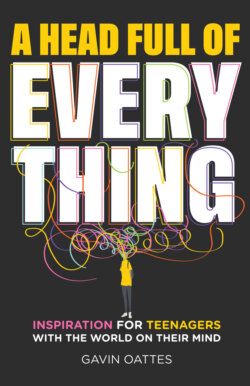Читать книгу A Head Full of Everything - Gavin Oattes - Страница 15
Growing Up Is Optional
ОглавлениеThink back to when you were about 7 years old and your teacher gave you a reading book that you had already read the year before with your previous teacher.
How'd that make you feel?
I'll tell you how it made the kids feel the first time I made that mistake as a teacher.
Furious. They were furious with me.
Why?
Because at the age of 7, we want nothing more than to be moved up a reading level. The only thing we want more than that is for all our classmates to see, hear and hopefully acknowledge that we've been moved up!
In fact, the only thing we want more than this is to see the look of pride on our parents’ faces.
This was one of the many things that amazed me during my time as a teacher.
‘HANG ON, YOU'RE A TEACHER, GAV? WHEN WERE YOU GOING TO TELL US THIS?!’
Ok, so I managed to squeeze in a teaching degree along the way. I'm qualified to teach kids aged 3–12.
Every single day as a primary school teacher young kids amazed me. There are so many moments of inspiration. Like when the queues form at the teacher's desk. You've all stood in those queues. There are loads of reasons why kids stand in them but there's 2 big ones.
The first is to ask for help. This really is a biggie.
I like to imagine we're all born with the unique ability to ask for help. It's such a natural thing to ask for when we're very young. But it's like we un‐learn this skill. By the time we've hit our teens asking for help can feel silly, embarrassing or even weak. There is nothing weak in asking for help, in fact, quite the opposite. Asking for help is what makes us stronger. It connects us with others, allowing us to surround ourselves with people that make us feel good and encourage all sorts of new learning and adventure. Asking for help can create optimism and hope. Be sure to do it more.
Another thing that always amazed me as a primary school teacher was those moments I was sitting doing my work as all the kids were doing theirs, and the queue formed to my right‐hand side. Now we've all stood in that queue, we know what it's like. It usually consists of a row of children with great big smiles on their faces, saying something along the lines of ‘I'm finished, what's next?’ It's like an absolute need at that age, a want and desire to learn, to progress, to prove themselves and to embrace the next challenge. We don't care what others think. We're ready, willing and more than able to take on the world, to be the best we can be, to dream and to think big.
You see, this is what inspires me most about wee kids. They always want to know what's next. They crave information and every single day as a teacher my mind was completely and utterly blown by the energy, passion, excitement and drive that those wee kids had, simply for what's next.
But there's a problem with being that age. And it's this …
We stop being that age.
That's it.
I'll say it again.
We stop being that age.
There's a technical term for it: ‘growing up’.
We leave primary school … and off we go into Teenagerland. You may also call it high school. A magical land filled with hopes and dreams. A future‐focussed paradise filled with ambition and desire. A training ground for growing up, fitting in and dealing with change.
Some people consider it a breeze; others do not. Some people consider it a portal to a better life; others do not. Some people consider it a prison full of assholes; others do not.
Everyone thinks differently when it comes to high school. One thing I can guarantee, however, is that in Teenagerland we do our most thinking. Not necessarily our best thinking but we definitely do our most thinking.
But it is our thinking and thinking alone that will determine the experience we have as a teenager. And as all the experts tell us, happiness doesn't come from things, it comes from experiences.
